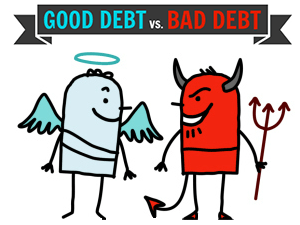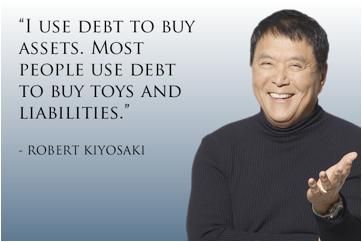We have seen finance experts like Dave Ramsay tell us to cut up our credit cards. We have seen how delinquent home loans not only caused people to lose their homes but also a systemic crisis that spread across several financial institution and countries during 2008. Repossessed cars and two wheeler are common in many low income households. To add to this trouble student loan defaults have become high all over the world as the income opportunities often don’t match up with the cost of some of these courses.
So is debt a bad thing? Should we indeed cut up credit cards? Save for 15+ years to buy a home. Never take a loan in our life?
From Shylock of ‘Merchant of Venice’ to today’s bank that offer Personal loans and credit cards with dubious terms the bankers have been portrayed as Vultures. It is often joked ‘Banks will only lend money to those that don’t need them.’. Are these Financial institutions just vultures that serve no real need?
Is Debt Bad?

Robert Kiyosaki distinguishes debt as ‘Good Debt‘ and ‘Bad Debt’. Good debt is one that puts ‘money in your pocket.’ i.e creates an asset. Bad debt is one that takes money out of it i.e is a liability. Let’s try to understand this statement.
Good Debt
Micro Finance is a great example for good debts. Micro Finance institutions provide loans to women co-operative societies to set up a shop, buy cattle, get a sewing machine, ventures that can be set up in a very short time and start producing cash flows/income immediately. They often pay interest as high as 25%, but it is still a good loan as long the loan enables them to create an income producing asset that would pay off the loan.
Business Loans by banks, loan to buy commercial vehicles are more conventional examples of a good debt. What makes a debt good is that it creates net positive cash flow ie cash income over and above the EMI.

Bad Debt
It has become more common these days to see offers for EMI to buy Furniture, Smart Phones, Travel to Europe Etc. From having been a traditional savers cash economy we are slowly moving towards getting immediate gratification through credit. These are bad debts because they take money out of your pocket often leave a deep hole i.e the debt creates an expense and not an income.
It is not uncommon these days to see bikes worth several lakhs in low income neighborhoods and student accommodations. Bought either on loans or on life savings of their parents. I would say these are some typical examples of Bad Debts. Often these expensive bikes are fuel guzzlers with expensive maintenance.
There is ofcourse no harm in buying one, so long as you can pay for it for the money you have saved up for that purpose. Delay your gratification. Earn your dream rather than swipe your way to it. Personal Loans for extravagant wedding also falls into this category.
The inbetweens
Student Loans
Cost of Education has become very high. Student Loans provide many the opportunity to take up courses that that they would otherwise not have. But a careful evaluation is required before one signs up for such an expensive course.
In 2008, when I enrolled for my MBA in a prestigious B’ School, it was truly a dream come true for me. I thought I was set for life. The economy had started showing signs of slowness, it was expected (at that time) when I graduated in 2009, it will be all hunky dory again. Investment banks will lap up MBA grads from top B’schools like mine. With excellent placement records and even their base salary for a graduate being nearly twice of what I was receiving then, it all looked perfect. Until it was not. When my banker asked me hypothetically, ‘what if you couldn’t land a job after the course’, I was almost livid.
My Story
When I graduated in mid 2009 it was peak recession. People who were already in jobs were losing them. Most companies in Singapore (where my B’school was) refused to even entertain an interview unless we already had a work permit. The one week of placement where the companies were supposed to throng was empty from Day 0. Most of us used it as a mid semester break and explored the country as no classes where scheduled through the week. Inspite of being one of the more experienced candidates in the batch and on top of the class, I did not attend a single campus interview in person. Most telephonic interviews and tests just turned out to be a hog wash. My banker turned out to be right. I graduated without a job like most of the rest of the batch.
The story is not to lament but to just say, the realm of possibilities in life is beyond what we can comprehend. There are no sure things, we have to be prepared for the unexpected to strike at any time.
Examine your school carefully, the course, the job prospects, placement assistance, what your chances are of in standing out from the crowd. Be prepared.
Home Loans
Home loans enable us to purchase a home many years ahead of what our savings would allow us . Hence permit us to participate in the capital appreciation, save on rent as well as use the tax savings that most governments around the world generously provide.
If there are so many advantages, then how could one go wrong? Why is it in the inbetweens?
It is exactly this thought process that lead us to the housing bubble and the eventual meltdown. We have been told during those days that, “Availability of land is limited. With increasing population, demand will increase. So land prices and hence property prices can only go up.” The theory has been proven wrong.
All asset prices are determined by demand and supply, all unnatural increases will lead to corrections.
Buy or Rent?
Whether it is right to buy or rent can only be determined by your unique circumstances – Non Financial ones like the need for the family to settle down in a place and financial ones like Can I afford to pay EMI if we lose one or both incomes temporarily, does the sum of rent and taxes saved trump the opportunity of capital appreciation of the amount in an investment?
Don’t believe everything the marketing brochure tells you. Collect Facts for and against and take a calculated wager.
Are bankers Vultures?
Bible and Quaran termed it a sin to lend money on interest. I’m not aware of anything similar in hindu texts. But somehow people tend to compare borrowing from a bank similar to that of from family and friends. A Bank is a business, they are trying to make money by lending to you. They are not obliged to help you out during your difficult times. The banker is obligated to his own shareholders and lenders, so it is natural for him to expect to be compensated for taking a higher risk by lending to a less credit worthy borrower without a collateral.
Rather than blaming someone who is only doing his job, let us take responsibility in understanding what we sign up for. No one is obliged to take care of you – not your government, not your children, not your parents, not your employers, and not even your spouse. Educating ourselves and taking responsibility is the only way to win this game.
Paradoxically or not, Alan Greenspan, Former Fed Chairman did say once
“Any informed borrower is simply less vulnerable to fraud and abuse.”
Debt is a double edged sword. You can be a samurai and win your battle with it, or be an amateur and hurt yourself. You choose.

Do we have a mathematical example for the following statement- does the sum of rent and taxes saved trump the opportunity of capital appreciation of the amount in an investment?
You could try this : https://www.magicbricks.com/advice/buy-rent-calculator-financial-advice. However Magic bricks does not consider the opportunity cost of investment and other maintenance expenses like property taxes, monthly maintenance. Thy NY times has a more sophisticated calculator here : https://www.nytimes.com/interactive/2014/upshot/buy-rent-calculator.html Plug in the numbers and see how it looks for you. It is of course alright to take the costlier choice, we just need to do it knowingly and for a reason.
The usual quandry: Should I take a loan for this? Insightfully answered in this post.
the better question is ofcourse..Do I need this? and Do I need this now? and what does this enable ?